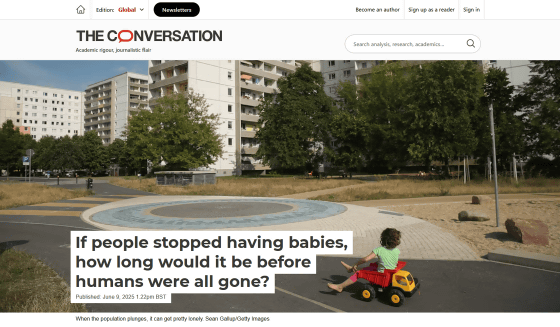How long would it take for humans to go extinct if they stopped having children?

In recent years, declining birth rates have become a problem in many countries around the world, and in Japan, the number of children born in 2024 will be
If people stopped having babies, how long would it be before humans were all gone?
https://theconversation.com/if-people-stopped-having-babies-how-long-would-it-be-before-humans-were-all-gone-255811

First, Little points out simply that 'very few people live longer than 100 years, so if nobody stopped having children, the human race would probably disappear from the face of the earth within 100 years,' but even if all births suddenly stopped, the population decline would still occur slowly.
As the population declines, the elderly die off, and the younger generation eventually becomes middle-aged and elderly, but the younger generation never gets born. So, Little believes, eventually there will not be enough people to do the jobs that are essential to keeping society running, and social sectors around the world will collapse rapidly.
These sectors will collapse, including food production, healthcare provision, infrastructure like electricity and water, and all the activities that humanity as a whole needs. So even with fewer people to feed, people will struggle to make ends meet and there will likely be food shortages.
'As a professor of anthropology who has spent his career studying human behavior, biology and culture, I have to admit that this is not a good situation,' Little said. 'Ultimately, civilization would collapse. There would be very few survivors within 70 or 80 years, let alone 100, because of shortages of food, clean water, prescription drugs and all the other survival necessities that we can easily purchase today.'

But it's highly unlikely that a global catastrophe would cause everyone in the world to stop being able to have children. Little points out that in his novel '
Margaret Atwood 's ' The Handmaid's Tale ,' which has also been adapted into a TV drama and a film, depicts a world in which fertile women are turned into 'handmaids,' tools for producing children, in a world where the birth rate has plummeted. P. D. James 's ' The Children of Men ,' which is the original story for the film ' The World Begins, ' is also set in a world where humans have lost the ability to reproduce and no children are born for 18 years. Both of these works depict worlds in which human suffering and chaos are rampant.

On the other hand, in the 1960s and 1970s, there were concerns that the Earth's population was too large, which could cause problems. At the time of writing, the world's population is still growing, but the pace is slowing.
According to experts in demographics, the world's population is expected to peak at 10 billion in the 2080s, up from about 8 billion at the time of writing. However, it is predicted that the world's population will gradually decline as the death rate exceeds the birth rate due to the declining birthrate and aging population.
Little points out that it is important to have an appropriate balance between young people and older people because young people are the driving force behind society, bringing new ideas to fruition and producing everything used in society. Also, because older people, who have declining physical and cognitive abilities, need help from younger people with basic activities like eating and dressing, if the balance between the elderly and the young is too bad, both parties will suffer.
Falling fertility rates are due in part to younger generations choosing to have fewer children than their parents' generation, and to declining sperm counts in men. National population decline can be mitigated to some extent by immigration, but this can be resisted by political and cultural factors.
It turns out that men's 'sperm count' has halved worldwide in the past 40 years, and the pace of decline has accelerated since the 21st century - GIGAZINE

Little points out that the Neanderthals , who lived at the same time as modern humans (Homo sapiens) , became extinct because Homo sapiens were more successful in reproducing. If Homo sapiens were to become extinct, it could create an opportunity for other animals to thrive on Earth.
However, as an anthropologist, Little also argues that it would be sad to lose human culture, including art and science. He called for efforts to curb climate change, avoid war, and maintain biodiversity in order for humans to survive on Earth for a long time.
Related Posts:
in Science, Posted by log1h_ik







